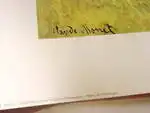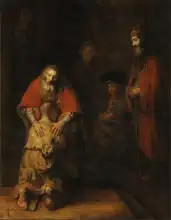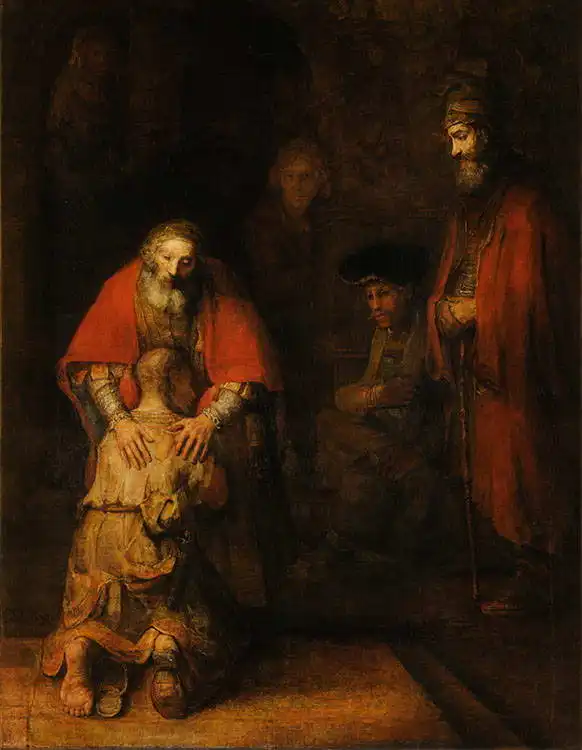About this finishing
Print. The image is printed on the top quality 10-ink HP Z9PS printer on HP matte 270 g / m2 paper. You can choose any size to an accuracy of 1 cm. A margin of 5 cm around the image is added to the size of the motif.


You can find a detailed description about our finishings
here.
Return of the Prodigal Son
Date:
1669Medium:
oil on canvasDimensions:
262 x 205Rembrandt painted the biblical story The Return of the Prodigal Son in the painting. The painting is beautiful and full of thoughtful details and symbols: the younger son in ragged clothes still has a sword at his waist, symbolizing that he is still his father's son (he could have sold the sword long ago, but still didn't). His shoes are torn and his legs are broken from the long journey. A head cut almost bare represents a loss of personality or individuality, similar to how conscripts in the army are cut. The older son watches the whole scene in the painting. Strikingly similar to his father (similar clothing or beard). Unlike the father who offers his younger son open arms (open clothes, blessing hands), the older son has a closed attitude (clothes and hands are buttoned and folded) and his gaze is withdrawn, cold and dark. The red mantle represents the protective wings of the mother.
The center of the picture, the most striking element, are the father's hands: in them the younger son finds comfort, reconciliation and forgiveness. Even a tired father and an unhappy parent find relief in this gesture. One hand symbolically protects the wounded leg, the other hand encourages the will to live. The seated man is the administrator. He beats his breast, representing sinners and publicans. The father is almost blind and yet he can see. Although his eyes, hands, cloak, bent body evoke an image of paternal love marked by sorrow, sadness, hope and waiting, the father does not desire punishment. His heart desires to bring his children back home. He offers them unconditional love and peace.
Rembrandt painted picture Return of the Prodigal Son in 1669. Prevailing color of this fine art print is dark and its shape is portrait. Original size is 262 x 205. This image is printed on demand - you can choose material, size and finishing.
Rembrandt Harmenszoon van Rijn (1606-1669). Dutch painter considered one of the greatest painters of all time, who particularly affected the history of art. Already during his lifetime, he achieved great renown - he painted famous contemporaries and taught dozens of outstanding painters. He often painted biblical themes (for example,
Storm at Sea of Galilee or observations of the Jewish community in Amsterdam). His most famous and popular work is
Night Watch - the military retinue of Captain Frans Banning. The painting was named by its discoverer Sir Joshua Reynolds for its dark colour (the picture is, in fact, full of daylight). Another of his beautiful paintings is worth mentioning:
Return of the Prodigal Son.



